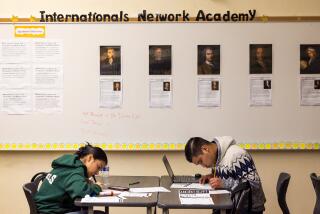A Taxing Matter : Volunteer Accountants Steer Soviet Jewish Immigrants Through Mysteries of IRS Forms
- Share via
In the old country, Inessa Kramarova didn’t have to worry about taxes. The 22.50 rubles that was taken for the government from her pay of 126.50 rubles each month was the concern of a clerk. The taxes were deducted in advance and never thought about again, and her take-home was all hers.
Things are different in America. For one thing, taxation in America works on the honor system, at least until the IRS catches up with you. For another, even if taxes are withheld from your pay, there are still forms to be filled out.
That can be daunting even for native English-speaking taxpayers. For people like Kramarova, a recently arrived Soviet Jewish refugee, it can be confusing and frightening, and finding help can be expensive.
But Kramarova and about 200 other Soviet immigrants were given a hand with their taxes this year by volunteer accountants recruited by the United Jewish Fund.
The accountant who filled out Kramarova’s tax return last week told her that she was in line for a $425 federal refund and $80 from the state of California.
“It was so helpful,” said Gail Barkhash, formerly of Riga and now, like Kramarova, a resident of West Hollywood. “We didn’t know at all how to start to fill out all these forms, and from what end.”
The service saves the immigrants the cost of a visit to a tax preparation service, which could cost as much as $80--a big chunk of money for new arrivals whose incomes barely reach five figures.
“This helps a lot. For me, it’s a lot,” said Kramarova, who was a medical librarian in Kiev but is now scraping by with a part-time job as a preschool aide.
The volunteer accountants, many of whom charge more than $200 an hour in their private work, found other satisfactions from their volunteer duty, they said.
“Usually you’re doing it on monetary terms, but here you’re using your training for somebody who needs your help, and you don’t usually do that in our field,” said Arnold Anisgarten, a CPA who helped organize the program.
The experience also gave him a chance to bone up on the tax field. He found that he had to deal with issues that don’t come up when working with his usual clients. As an example, he cited the earned income credits for workers whose incomes fall below the poverty line.
There were also misunderstandings. Polina Jaeger, who gave a two-hour talk about the tax system, said the crowd of immigrants was excited about the prospect of collecting the renter’s credit.
“I realized that they thought they were getting all their rent back, so we had to explain that it’s just a small amount,” she said. The renter’s credit is a benefit worth about $50.
As for the amount of money that goes to the government, “we think that we pay too much, but we trust that this money will go to the right things,” Barkhash said. “That I can’t say about the Russian government.” Barkhash, a former engineer, now works as a counselor and translator for Jewish Family Services, a social work agency.
There are about 50,000 former Soviet Jews in Southern California.
More to Read
Sign up for Essential California
The most important California stories and recommendations in your inbox every morning.
You may occasionally receive promotional content from the Los Angeles Times.










